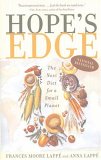Summary | Excerpt | Reviews | Readalikes | Genres & Themes | Author Bio

Critics' Opinion:
Readers' Opinion:
First Published:
Jan 2002, 400 pages
Paperback:
Apr 2003, 400 pages
Sure, this view of ourselves is reinforced minute by minute through today's crass media messages, but we've also been absorbing it for a very long time. Seventeenth-century philosopher Thomas Hobbes put it quite bluntly: "Homo homini lupus"-we are to each other as wolves. Too bad Hobbes had no appreciation of the social nature of wolves; he meant that we are by nature at one another's throats. This view runs deep in American culture: Alexis de Tocqueville, revered for his penetrating insight into our national character, wrote in 1835 "Private interest...is the only immutable point in the human heart."
Thought Trap Three: Let the market decide, experts preside. From this limited view of ourselves flows Big Idea Three: Since we humans are utterly ego-bound, genuine deliberation over our public choices-the ground of democracy itself-is suspect. The most selfish among us will only subvert it to their own ends. Best leave choices to the impersonal, neutral force of the market, which requires nothing of us except to be our selfish little selves.
While this thought trap has ensnared us for hundreds of years, in the last thirty it's acquired new vigor. "Market fundamentalism" is what financier George Soros calls it.
Seeing ourselves as narrowly self-centered, incapable of democratic self-governance, of course we distrust government. It's inept at best, corrupt at worst. With market fundamentalism in full bloom since the Reagan era, we've seen a rush to turn over to private companies essential functions long considered public responsibilities-from the incarceration of prisoners, to the schooling of children, to the control of the world's water. Already, sales of water worldwide total one-third again as much as pharmaceutical sales.
We've also cut back government's role in regulating industries in the public interest. To cite just one example, in the '90s a new federal system for inspecting meat was developed with help from the meat industry itself. In it, federal inspection has been reduced to a sample of less than .01 percent of carcasses-even though the Centers for Disease Control estimate that almost a third of all turkey and six percent of all ground beef carries deadly salmonella. And 76 million people each year suffer from food-borne illness; five thousand die.
Bewitched by what Reagan called the "magic of the market," we end up weakening a powerful vehicle-accountable government-for coming together as citizens, from the local to the national to the international level, to resolve our deepening social and environmental crises.
This thought trap in which the only real threat is too-big government-since corporations are simply products of the all-good market-leads us in an ironic and scary direction. The biggest promoters of the market-private corporations-are killing it; they're destroying the diversity of players on which a free market rests. Since I wrote the first Diet, in every major sector of our economy a handful of corporations has come to dominate. Of course, it's hard to perceive this trend through the maze of ever-proliferating products, like Kraft cheese, Maxwell House coffee, Post Raisin Bran, and Altoids breath mints-all from a single company (in this case, Philip Morris).
It would be bad enough if such concentrated power only meant steeper prices from diluted competition. It would be bad enough if weakened competition only meant shoddier products and poorer service. But it's much worse. Once public elections are financed by private contributions; when private entities control more resources than do public ones, the stage is set for the massive disregard of public welfare.
Nowhere is this clearer or scarier than with regard to our food supply. The U.S. Department of Agriculture, for example, cooperated with corporations that were developing genetically modified organisms. So today, GMO products line most grocery shelves, yet Americans know virtually nothing about them or their risks. In fact, 70 percent of Americans still believe they have never eaten GMOs. Adding insult to injury, our government, yielding to industry pressure, refuses to mandate labeling GMOs so that the public might at least know what it's eating.





The Flower Sisters
by Michelle Collins Anderson
From the new Fannie Flagg of the Ozarks, a richly-woven story of family, forgiveness, and reinvention.

The House on Biscayne Bay
by Chanel Cleeton
As death stalks a gothic mansion in Miami, the lives of two women intertwine as the past and present collide.

The Funeral Cryer by Wenyan Lu
Debut novelist Wenyan Lu brings us this witty yet profound story about one woman's midlife reawakening in contemporary rural China.
Your guide toexceptional books
BookBrowse seeks out and recommends the best in contemporary fiction and nonfiction—books that not only engage and entertain but also deepen our understanding of ourselves and the world around us.